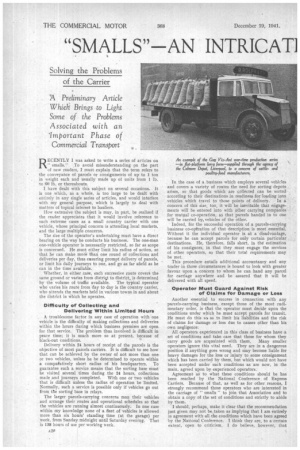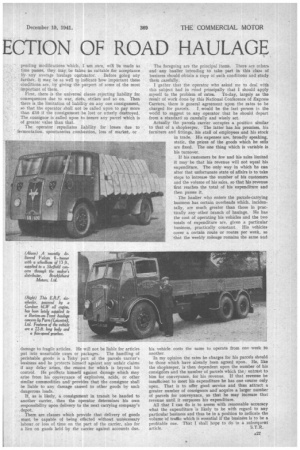"SMALLS" AN INTRICAT1 ECTION OF ROAD HAULAGE
Page 32

Page 33

If you've noticed an error in this article please click here to report it so we can fix it.
Solving the Problems of the Carrier
A Preliminary Article Which Brings to Light Some of the Problems Associated with an Important Phase of Commercial Transport
R" ECENTLY I was asked to write a series of articles on smalls." To avoid misunderstanding on the part of new readers. I must explain that the term refers to the conveyance of parcels or consignments of up to 1 ton in weight each and usually made up of units from 1 lb. to 60 lb, or thereabouts.
I have dealt with this subject on several occasions. It is one which, as a whole, is too large to be dealt with entirely in any single series of articles, and would interfere with my general purpose, which is largely to deal with matters of topical interest to hauliers.
How extensive the subject is may, in part, be realized if the reader appreciates that it would involve reference to such extreme cases as a small country carrier with one vehicle, whose principal concern is attending local markets, and the large multiple concerns.
The size of the operator's undertaking must have a direct bearing on the way he conducts his business. The one-man one-vehicle operator is necessarily restricted, so far as scope is concerned. He must either limit his radius of action, so that lie can make more than one round of collections and deliveries per day, thus exsuring prompt delivery of parcels, or limit his daily journeys to one, and go as far afield as he can in the time available.
Whether, in either case, each successive route covers the same ground or varies from district to district, is determined by the volume of traffic available. The typical operator who varies his route from day to day is the country carrier, who attends the markets held in various towns in and about the district in which he operates.
Difficulty of Collecting and Delivering Within Limited Hours . A troublesome factor in any case of operation with one vehicle is the difficulty of making collections and deliveries within the hours during which business premises are open for that service. The problem thus involved is difficult in peace time; it is much more so at present, because of black-out conditions.
Delivery within 24 hours of receipt of the parcels is the objective of most parcels carriers. It is difficult to see how that can be achieved by the owner of not more than one or two vehicles, unless be be determined to operate within a comparatively short radius of his headquarters. To guarantee such a service means that the sorting base must be visited several times during the 24 hours, collections made and journeys completed. With one or two vehicles that is difficult unless the radius of operation be limited. Normally, such a service is possible only if vehicles go out from the sorting base in relays.
The larger parcels-carrying concerns man their vehicles and arrange their routes and operational schedules so that the vehicles are-running almost continuously. In one case within my knowledge none of a fleet of vehicles is allowed more than six hours' standing time (at the garage) per week, from Sunday midnight until Saturday evening. That is 138 hours of use per working week.
In the case of a business which employs several vehicles and covers a variety of routes the need for sorting depots arises, so that goods which are collected can be sorted according to their destinations in readiness for loading into vehicles which travel to those points of delivery. In a concern of this size, too, it will be inevitable that engagements will be entered into with other carrying companies for mutual co-operation, so that parcels handed in to one will be carried by. vehicles of the other.
Indeed, for the successful operation of a parcels-carrying businessco-optration of that description is most essential. Without it the individual operator is at a disadvantage, because he can accept parcels for only certain particular destinations. He, therefore, falls short, in the' estimation of his consignors, in that they must engage the services of other operators, so that their total requirements may be met.
This procedure entails additional accountancy and any trader in those circumstances is bound to look with greater favour upon a concern to whom he can hand any parcel for carriage anywhere and be assured that it will be delivered with all speed.
Operator Must Guard Against Risk of Claims for Damage or Loss Another essential to success in connection with any parcels-carrying business, except those of the most rudimentary order, is that the operator must decide upon the conditions under which he must accept parcels for transit. He must do this so, as to limit his liabilities and the risk of claims for damage or loss due to causes other than his own negligence.
All operators experienced in this class of business have a set of conditions and take care that those for whom they carry goods are acquainted with them. Many smaller operators ignore this vital need. They are in a dangerous position if anything goes wrong and may become liable for heavy damages for the loss or injury to some consignment which has been carried by them, but which would not have been accepted under such conditions as are now, in the main, agreed upon by experienced operators.
Agreement as to what these conditions should be has been reached by the National Conference of Express Carriers. Because of that, as well as for other reasons, I strongly recommend those operators who are interested in the carriage of " smalls" to join that Association and to obtain a copy of the set of conditions and strictly to abide by them.
I should, perhaps, make it clear that the recommendation just given may not be taken as implying that I am entirely in agreement with all the conditions which have been agreed by the National Conference. I think they are, to a certain extent, open to criticism, 1 do believe, however, that
pending modifications -Which, I am sure, wilc.be made as time passes, they may_ be taken as suitable for acceptance
by. any average haulage cqntractor. Before going any further, it may be as well to indicate how important these conditions are, by giving the purport of some of the most important of them.
• First, there is the universal clause rejecting liability for consequences due to war, riots, strikes and so on. Then there is the limitation of liability on any one consignment, so that the operator shall not be called upon to pay more than £10 if the consignment be lost or utterly destroyed. The consignor is called upon to insure any parcel which is of greater value than that.
The operator repudiates liability for losses due to fermentation, spontaneous combustion, loss of market, or damage to fragile articles. He will not be liable for articles put into unsuitable cases or packages. The handling of perishable goods is a lisky part of the parcels carrier's business and he protects himself against any unfair -claims if any delay arises, the reason for which is beyond his control. He prottcts himself against damage which may arise from his conveyance of explosives, acids, or other similar commodities and providesthat the consignor shall be liable to any damage caused to other goods by such dangerous loads.
If, as is likely, a consignment in transit be handed to another carrier, then the operator determines his own responsibility upon delivery to the next carrying company's depot.
There are clauses which provide that delivery of goods must be capable of being effected without unnecessary labour or loss of time on the part of the carrier, also for a lien on goods held by the carrier against accounts due.
The foregoing are the principal items. There are others and any haulier intending to take part in this class of business should obtain a copy of such conditions and study them carefully.
gather that the operator who asked me to deal with this subject had in mind principally that I should apply myself to the problem of rates. To-day, largely as the result of work done by this National Conference of Express Carriers, there is general agreement upon the rates to be
charged for parcels. I would be the last person in the
world to suggest to any operator that he should depart from a standard so carefully and wisely set.
Actually the parcels carrier occupies a position similar to that of a shopkeeper. The latter has his premises, his furniture and fittings, his staff of employees and his stock in trade. His expenses are, broadly speaking, static, the prices of the goods which he sells are fixed. The one thing which is variable is his turnover.
If his customers he few and his sales limited it may be that his revenue will not equal his
expenditure. The only way in which he can
alter that unfortunate state of affairs is to take steps to increase the number of his customers and the volume of his sales, so that his revenue first reaches the total of his expenditure and then passes it.
The haulier who enters the parcels-carrying business has certain overheads which, inciden
tally, are much greater than those in practically any other branch of haulage. He has the cost of operating his vehicles and the two totals of expenditure are, given a particular business, practically constant. His vehicles cover a certain route or routes per week, so that the weekly mileage remains the same and
his vehicle costs the same to operate from one week to another
In my opinion the rates he charges for his parcels should be those which have already been agreed upon. Ile, like the shoykeeper, is then dependent upon the number of his consignors and the number of parcels which they entrust to him for conveyance, for his revenue. If that revenue be insufficient to meet his expenditure he has one course only open. That is to offer good service and thus attract a greater number of consignors and acquire a larger number of parcels for conveyance, so that he may increase that revenue until it surpasses his expenditure. All that I can do is to assess with reasonable accuracy what the expenditure is likely to be with regard to any particular business and thus be in a position to indicate the volume of traffic which is essential if the business is to be a profitable one. That I shall hope to do in a subsequent
article. S.T.R.
























































